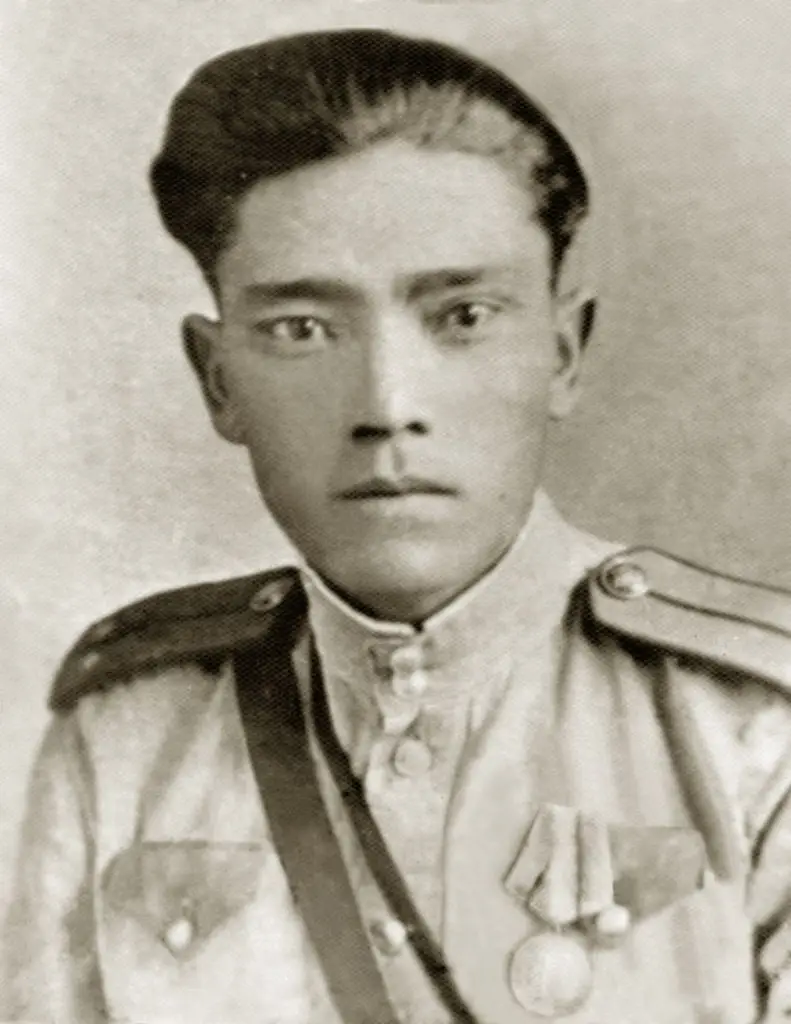Three births of Misha Cherny

Every kind of vileness rejoiced...
Kalmyk boy from the Volga - Black Misha -
He fought for his native Belarus.
Partisan poet Mikhail Vankaevich Khoninov was born in 1919 into the family of a farm laborer in the village of Tsagan-Nur, Maloderbetovsky ulus, Kalmyk district, Astrakhan province. In 1935 he wrote his first poem. Before being drafted into the army in 1939, Mikhail managed to study in the acting department of a technical school in Astrakhan, work as a drama theater actor and radio announcer.
Since 1939 he served in the Red Army. In 1941, after graduating from the Sretensky Infantry School, he received the rank of junior lieutenant. Mikhail met the war as a platoon commander of snipers in the 646th Infantry Regiment of the 152nd Infantry Division of the 16th Army of the Trans-Baikal Military District.
Misha-Kalmyk
In July 1941, Mikhail took part in the battles near Yelnya and Smolensk, where he was left with a group of soldiers to cover with machine-gun fire the escape of the remnants of the regiment from encirclement. The severely shell-shocked lieutenant was found in a trench by children from the village of Senino, Demidovsky district, who were collecting weapon on the battlefields. One of them, Smolensk teenager Dmitry Streltsov, brought the wounded man home. His mother Maria Vasilyevna Streltsova hid the wounded man in her home, and so that the Germans would not enter the hut, they wrote on it that the residents were suffering from typhus.
After recovery, Mikhail joined the Smolensk partisans. Khoninov did not take Dmitry Streltsov, who asked to accompany him, with him. Mikhail learned about the fate of his savior after the war from a letter from his cousin Dmitry. The traitors handed the boy over to the police after trying to establish contact with the underground. Dmitry was shot in front of his relatives.
Until April 1942, Khoninov fought in the ranks of a partisan group in the Smolensk region, where he was known under the nickname “Misha-Kalmyk”. The liaison officer in their partisan detachment was the future Hero of the Soviet Union Mikhail Egorov, who hoisted the Red Banner over the Reichstag in May 1945.
In October 1941, Khoninov, on instructions from the command, moved to the Belarusian forests to organize the partisan movement. On the way, Mikhail is captured and, during interrogation by the Germans, pretends to be a horse thief stealing collective farm horses. He is sent to a prisoner of war camp, where he does not end up - with a group of arrested people, Khoninov escapes by jumping into the river through a hole cut in the carriage.
Misha Cherny
At the same time, in the Berezinsky district, Mikhail Khoninov was ambushed and wounded. And again he is saved by a local resident. This time, the Belarusian peasant woman Praskovya Andreevna Velitkevich from the village of Mestino becomes his godmother. She hid the wounded soldier, and then connected him with the partisan detachment in which her husband and son fought.
In the spring of 1942, Mikhail became the chief of staff of the partisan detachment (commander Ivan Starodubtsev, commissar Pyotr Velitkevich), then headed a sabotage platoon. The main tasks of Khoninov’s platoon were reconnaissance and the demolition of railway bridges and enemy vehicles.
In April 1942, during the defeat of the German garrison in the village of Kolbche, Klichevsky district, Khoninov and his platoon were the first to storm enemy bunkers and hoist a partisan banner over the village, together with Pyotr Velitkevich they sank a towing steamer with barges on the Berezina River. In July 1942, Khoninov entered the location of German troops in the village of Berdo to conduct propaganda work, as a result of which 50 soldiers from different European countries joined the partisans.
Since May 1943 - commander of a separate partisan company with the call sign "Misha Cherny". The company's main area of responsibility was the Warsaw-Moscow highway. Khoninov’s international company operating in the Mogilev region was nicknamed the “wild division” by the invaders, and punitive forces assigned a reward of 10 occupation marks for the head of Misha Cherny.
Personal combat account of Mikhail Khoninov (from his autobiography):
In August 1944, Lieutenant Khoninov was demobilized and sent into exile to his previously deported family. Alexander Demidov’s documentary story “He was the first to attack,” the fiction story “Sparks under the Ashes” by Andrei Dugints, as well as Shirab-Nimbu Tsydenzhapov’s play “Larks Sing the Same Everywhere,” poems by Vladimir Mikhanovsky, Nikolai Polivin and Konstantin Erendzhenov are dedicated to his partisan exploits.
Mikhail Khoninov died in 1981, leaving us the legend of the partisan hero and his poems (translation by A. Nikolaev):
War is not a song
And damn
War is a rattlesnake.
Where are you, my forest brothers,
Where is the partisan family?
Where is my machine gunner from the Urals?
Kozlov died!.. - they tell me.
Because of this pass
They don't come back.
My demolition man Kovshirka,
Where are you?..
In the museum on the Berezina
My old friend looks from the portrait:
“He died a hero in the war.”
Where is my scout Prokopenko?
He hurried to his native Dnieper,
But in a Belarusian village
He was buried in the Jurassic.
They destroyed the garrisons,
Silently removing the posts at night,
And they cut off the echelons
That's the head
And then the tails.
And, running into ambushes
And having caused trouble to the fascists,
They were hiding
If needed,
And they quickly covered their tracks.
About their courage and heroism
The partisan knew our fire,
There were three sons in this trio
From three republics,
Three sisters.
In the winter all three of them left
Blow up bridges and trains
Having completed the task,
Heroes
They will never return to the forest...
Information